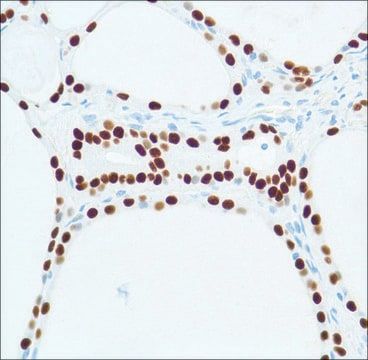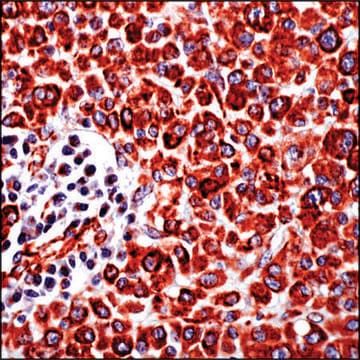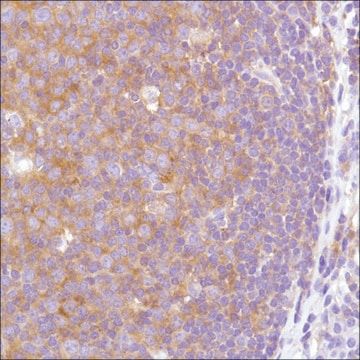SAB5500187
Anti-Thyroid Transcription Factor-1 antibody, Rabbit monoclonal
recombinant, expressed in proprietary host, clone SP141, affinity isolated antibody
Manufacturer: Sigma Aldrich
Select a Size
| Pack Size | SKU | Availability | Price |
|---|---|---|---|
| 100 μL | SAB5500187-100-μL | In Stock | ₹ 41,647.20 |
SAB5500187 - 100 μL
In Stock
Quantity
1
Base Price: ₹ 41,647.20
GST (18%): ₹ 7,496.496
Total Price: ₹ 49,143.696
biological source
rabbit
Quality Level
100
recombinant
expressed in proprietary host
conjugate
unconjugated
antibody form
affinity isolated antibody
antibody product type
primary antibodies
clone
SP141, monoclonal
species reactivity
human (tested)
species reactivity (predicted by homology)
rat, mouse
technique(s)
flow cytometry: 1:100immunohistochemistry: 1:100
Description
- General description: Thyroid transcription factor-1 (TTF-1), also known as NK2 homeobox 1(NKX2-1), is a member of the NKx2 family of homeodomain transcription factors. It binds and activates the promoter of thyroid specific genes such as thyroglobulin, thyroperoxidase, and thyrotropin receptor. TTF-1 is expressed in epithelial cells of the thyroid gland and the lung, and their derived tumors such as lung adenocarcinoma and small cell carcinomas and thyroid cancer. It is absent in mesotheliomas, breast cancer, and colon cancer.
- Immunogen: Synthetic peptide derived from the internal region of human TTF-1 protein.
- Features and Benefits: Evaluate our antibodies with complete peace of mind. If the antibody does not perform in your application, we will issue a full credit or replacement antibody. Learn more.
- Physical form: 0.1 ml rabbit monoclonal antibody purified by protein A/G in PBS/1% BSA buffer pH 7.6 with less than 0.1% sodium azide.
- Disclaimer: Unless otherwise stated in our catalog or other company documentation accompanying the product(s), our products are intended for research use only and are not to be used for any other purpose, which includes but is not limited to, unauthorized commercial uses, in vitro diagnostic uses, ex vivo or in vivo therapeutic uses or any type of consumption or application to humans or animals.
SAFETY INFORMATION
WGK
WGK 2
Flash Point(F)
Not applicable
Flash Point(C)
Not applicable
Compare Similar Items
Show Difference
biological source: rabbit
Quality Level: 100
recombinant: expressed in proprietary host
conjugate: unconjugated
antibody form: affinity isolated antibody
antibody product type: primary antibodies
clone: SP141, monoclonal
species reactivity: human (tested)
species reactivity (predicted by homology): rat, mouse
technique(s): flow cytometry: 1:100immunohistochemistry: 1:100
biological source:
rabbit
Quality Level:
100
recombinant:
expressed in proprietary host
conjugate:
unconjugated
antibody form:
affinity isolated antibody
antibody product type:
primary antibodies
clone:
SP141, monoclonal
species reactivity:
human (tested)
species reactivity (predicted by homology):
rat, mouse
technique(s):
flow cytometry: 1:100immunohistochemistry: 1:100
biological source: rabbit
Quality Level: 100
recombinant: expressed in proprietary host
conjugate: unconjugated
antibody form: tissue culture supernatant
antibody product type: primary antibodies
clone: SP20, monoclonal
species reactivity: human (tested)
species reactivity (predicted by homology): bovine, rat, hamster, frog, chicken, mouse
technique(s): flow cytometry: 1:100immunoblotting: 1:100immunohistochemistry: 1:200
biological source:
rabbit
Quality Level:
100
recombinant:
expressed in proprietary host
conjugate:
unconjugated
antibody form:
tissue culture supernatant
antibody product type:
primary antibodies
clone:
SP20, monoclonal
species reactivity:
human (tested)
species reactivity (predicted by homology):
bovine, rat, hamster, frog, chicken, mouse
technique(s):
flow cytometry: 1:100immunoblotting: 1:100immunohistochemistry: 1:200
biological source: rabbit
Quality Level: 100
recombinant: expressed in proprietary host
conjugate: unconjugated
antibody form: affinity isolated antibody
antibody product type: primary antibodies
clone: SP234, monoclonal
species reactivity: human (tested)
species reactivity (predicted by homology): pig, rat, mouse
technique(s): flow cytometry: 1:100immunohistochemistry: 1:100
biological source:
rabbit
Quality Level:
100
recombinant:
expressed in proprietary host
conjugate:
unconjugated
antibody form:
affinity isolated antibody
antibody product type:
primary antibodies
clone:
SP234, monoclonal
species reactivity:
human (tested)
species reactivity (predicted by homology):
pig, rat, mouse
technique(s):
flow cytometry: 1:100immunohistochemistry: 1:100
biological source: rabbit
Quality Level: 100
recombinant: expressed in proprietary host
conjugate: unconjugated
antibody form: affinity isolated antibody
antibody product type: primary antibodies
clone: SP235, monoclonal
species reactivity: human (tested)
species reactivity (predicted by homology): rat, mouse
technique(s): flow cytometry: 1:100immunohistochemistry: 1:100
biological source:
rabbit
Quality Level:
100
recombinant:
expressed in proprietary host
conjugate:
unconjugated
antibody form:
affinity isolated antibody
antibody product type:
primary antibodies
clone:
SP235, monoclonal
species reactivity:
human (tested)
species reactivity (predicted by homology):
rat, mouse
technique(s):
flow cytometry: 1:100immunohistochemistry: 1:100



